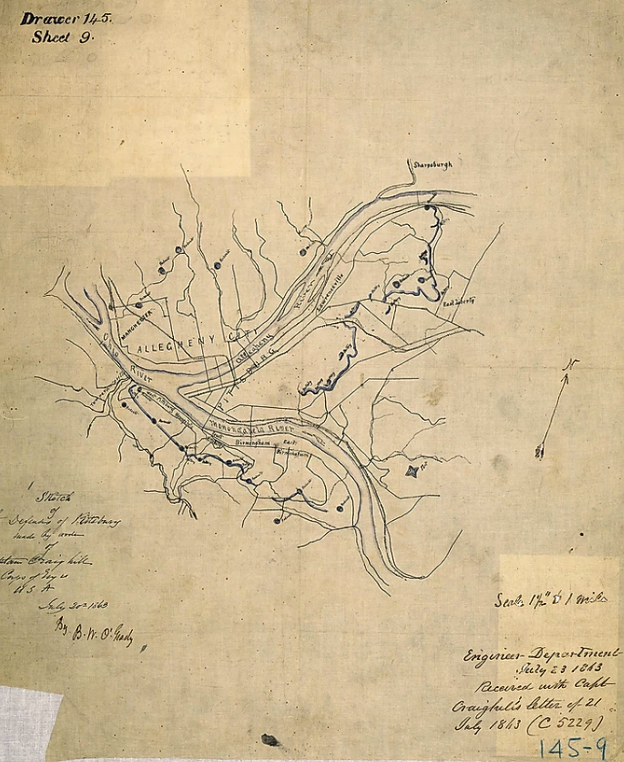As of March 16, 2020, Pennsylvania state officials declared that all dine-in restaurants and bars within five counties, including Allegheny, would close for two weeks. This mass shutdown comes in response to recent spreading of the COVID-19 coronavirus across the state. While this necessary decision promotes social distancing in populated areas and is felt heavily by the service industry and service industry workers, it is not the first time Pittsburgh has experienced these large-scale closures.
Pittsburgh’s response during the Civil War
With Robert E. Lee’s Confederate Army of Northern Virginia moving toward Pennsylvania in June 1863, the cities of Pittsburgh, Allegheny (North Side) and Birmingham (South Side) committed at least 11,000 workers to build defensive earthworks in the area under the direction of Union army engineers. The entire Keystone State, in fact, felt a wave of panic and uncertainty during the summer of 1863, however, Pittsburgh was seen as one of the most likely targets for Confederate forces. The “Iron City” was a site of importance, which the Pittsburgh Post-Gazette defined by the “facilities it contained for the manufacture of the munitions of war, its opportunities for receiving supplies from Canada, its capability of being strongly fortified,” and “its strategical power as severing the West from the East, rendering thus very difficult the movement of troops between the two sections.”
https://www.facebook.com/civilwarpittsburgh/photos/pcb.2770143679749388/2770139629749793/?type=3&theater
All nonessential businesses closed
While local citizens lacked accurate information regarding the movements of Lee’s army, they quickly prepared by assembling 37 defenses on the heights surrounding Pittsburgh and neighboring cities. To guarantee that full attention would be placed on construction of the defenses, all non-essential businesses, including pubs, restaurants, and stores, were to close their doors. Any proprietors who did not comply would be held in contempt. Some Pittsburgh newspapers even went as far to say that those who did not close for the requested time would be “marked and remembered” for manifesting “so much selfishness and illiberality during our present crisis.”
“… we have one subject of a general and bitter remark – the selfish and unpatriotic conduct of those churlish few who persist in keeping their doors open… while so many thousands of their fellow citizens are spending time and money, with an entire suspension of private business, laboring for the public defense. A stern public indignation should compel the general closing of the stores. Let all sacrifice their personal business for the public good… Let each bear his share of the burden, cheerfully and patriotically. We shall all feel better and safer after we shall have completed this good work… Public sentiment can compel the general closing of all the stores in Pittsburgh and Allegheny, while this emergency continues; at least it can make those who attempt to defy it, feel that they have committed a mistake in their estimate of the patriotism of the people.”
– The Pittsburgh Gazette – June 25, 1863
Just as many Pittsburgh citizens did over 150 years ago, most contemporary residents have risen to the occasion in a time of emergency. The few who refused to contribute to the greater good in 1863, as stated by the Pittsburgh Daily Post, were “visited by a party of men with a martial band, who requested them to close,” to which they “acted promptly upon the suggestion.”
https://www.facebook.com/civilwarpittsburgh/photos/a.1951081854988912/2770139713083118/?type=3&theater
More from Civil War Pittsburgh
Rich Condon runs the Civil War Pittsburgh website. Through events and social media, Rich shares the stories and places around western Pennsylvania that were significant to the Civil War.
We had Rich on our podcast to talk about some of the Civil War sites around Pittsburgh. You can listen to Episode 03 here:
📸 Header photo credit: A map of Pittsburgh’s 1863 defenses, commissioned by Captain William Craighill (via NARA)







